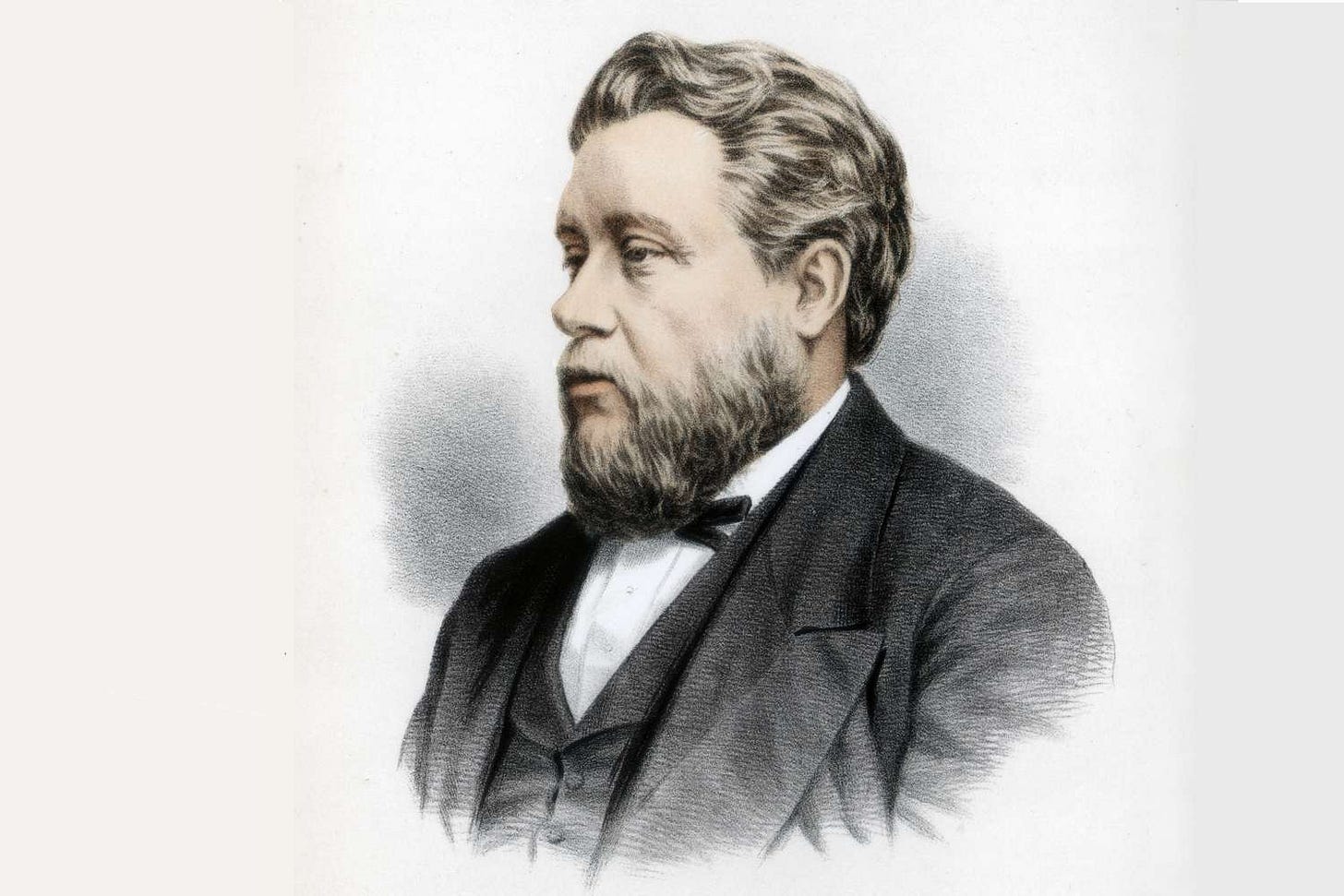
We Need a Real Christ—The Legacy of Spurgeon
Today is Spurgeon's birthday. Let's learn from his legacy.
Today is Spurgeon’s birthday.
Charles Haddon Spurgeon was born on June 19, 1834. He grew up in the sticks of England, was formed by the great Puritan works from his grandfather’s library, and was converted under a simple and powerful sermon from Isaiah, “Look unto Me, and be ye saved, all the ends of the earth: for I am God, and there is none else” (Isaiah 45:22 AV). He was compelled to simply look to Christ and believe and be saved. Anyone can look. A child can look, a struggling young man—like Spurgeon—can look; you can look to Christ, trust him and be born again.
Spurgeon, the Prince of Preachers, is one of the most fascinating figures of church history. His sermons were in such demand that they were printed and sold on the street, and eventually around the world, in a matter of days after he preached them. He wrote dozens and dozens of books. Spurgeon has the most words published in the English language. He started the Pastors’ College to train men for the work of ministry—even though Spurgeon had no academic training or pedigree other than a BA, “Born Again.” His ministry and generosity enabled him to personally provide half the cost needed for his church’s new facility—he gave around 1.5 million pounds for the project.
His church was marked by nothing short of revival and renewal under the power of the Spirit with the preaching of the gospel. In his time, Spurgeon pastored the largest church in the world. 14,693 people became members of the Metropolitan Tabernacle under Spurgeon’s leadership, with 11,000 of them through baptism/new converts.
Spurgeon’s words on the first Sunday at the Metropolitan Tabernacle, their church’s new facility that they had already outgrown, are a powerful reminder for all Christians:
I would propose that the subject of the ministry of this house, as long as this platform shall stand, and as long as this house shall be frequented by worshippers, shall be the person of Jesus Christ. I am never ashamed to avow myself a Calvinist, although I claim to be rather a Calvinist according to Calvin, than after the modern debased fashion. I do not hesitate to take the name of Baptist. You have there (pointing to the baptistery) substantial evidence that I am not ashamed of that ordinance of our Lord Jesus Christ; but if I am asked to say what is my creed, I think I must reply: “It is Jesus Christ.”
My venerable predecessor, Dr. Gill, has left a body of divinity admirable and excellent in its way; but the body of divinity to which I would pin and bind myself for ever, God helping me, is not his system of divinity or any other human treatise, but Christ Jesus, who is the sum and substance of the gospel; who is in himself all theology, the incarnation of every precious truth, the all-glorious personal embodiment of the way, the truth, and the life.
Spurgeon’s ministry, sermons, and life were marked by Jesus, and not only preaching the gospel or doctrines about Christ and salvation. Spurgeon preached Christ, the person, the Lord, our Bridegroom, our Friend, our Savior—Spurgeon preached Jesus as real.
In his sermon on Song of Songs 1:7, “You whom my soul loves,” delivered on September 30, 1860, Spurgeon makes this point on the need of a real Jesus. Is Christ real to you?
Do you not notice that the spouse here speaks of Christ as of one whom she knew actually to exist; not as an abstraction, but as a person…Brethren and sisters, there often is a great deficiency in our love to Jesus. We do not realize the person of Christ. We think about Christ, and then we love the conception that we have formed of him. But O, how few Christians view their Lord as being as real a person as we are ourselves, very man a man that could suffer, a man that could die, substantial flesh and blood very God as real as if he were not invisible, and as truly existent as though we could compass him in our minds. We need to have a real Christ more fully preached, and more fully loved by the church. We fail in our love, because Christ is not as real to us as he was to the early Church…We need Christ not an abstract, doctrinal, pictured Christ but a real Christ. I may preach to you many a year, and try to infuse into your souls a love of Christ; but until you can feel that he is a real man and a real person, really present with you, and that you may speak to him, talk to him, and tell him of your needs, you will not readily attain to a love like that of the text, so that you can call him, "You whom my soul loves."
There is no more vital spiritual question to ask ourselves: Is Jesus real to me?
For years, I believed that Jesus died for my sins, and rose for my salvation to give me eternal life—but I was totally lost on what it means to follow him for the rest of my life now. In some says, and I don’t think I’m alone here, Jesus was like a mascot for my life, my spirituality, and my experience of Christianity. He was a poster boy for spiritual enthusiasm and good living. Oh, how Jesus is so much more! That reality eventually clicked.
The love of Jesus, not only his love at the cross 2,000 years ago, but his real-time love for me now hit my heart like a bunker-busting missile. Everything changed. I changed. The way I read the Bible, listened to sermons, sang in church, and prayed all changed. I felt the love of Jesus in my bones, muscles, and heart. Once it hit me that there is a living, breathing, Jewish man—the Son of God who is also from Nazareth—who is reigning over the Universe, the one who loved me and gave himself for me, I couldn’t be the same again. Jesus is. He loves, cares, leads, helps, comforts, and encourages. We cannot reduce Jesus to a blurry doctrinal aura. He is a person. A real person who rose from the dead and invites us to walk with him.
I think if we sat with Spurgeon today, he would ask us, “Is Christ real to you?” There is no more important question.
Coffee Mug
To celebrate Spurgeon’s birthday, I’m launching my store with the Spurgeon Signature coffee mug, literally.
You’ll also find a Spurgeon shirt and a Humble Calvinism mug. Enjoy!
Books on Spurgeon
Spurgeon Autobiography. The official autobiography of Spurgeon, completed by his wife after his death.
C.H. Spurgeon: The People’s Preacher by Peter Morden. Morden’s work is not as well known as the next biography, but I think Morden is more accessible and enjoyable to read than Dallimore.
Spurgeon: A Biography by Arnold Dallimore. A classic and well-researched work on Spurgeon.
Spurgeon on the Christian Life: Alive in Christ by Michael Reeves. This is the best survey into Spurgeon and his spirituality and theology.
The Sum and Substance of the Gospel: The Christ-Centered Piety of Charles Haddon Spurgeon edited by Nathan Finn and Aaron Lumpkin. A great compilation work that can introduce you to Spurgeon’s writings and beliefs.
Spurgeon the Pastor: Recovering a Biblical and Theological Vision for Ministry by Geoffrey Chang. This is coming soon from Dr. Chang, the curator of the Spurgeon Library at Midwestern Seminary.
Online Resources
In the Steps of Charles Spurgeon (A Journey with Pictures) by Trevin Wax
Spurgeon.org - For all things Spurgeon.
Final Word
“He knew what I was when he chose me; he cannot therefore find out any fresh reason for turning me aside.”
— C.H. Spurgeon (1834–1892)













